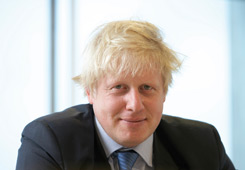Boris Johnson has praised London’s businesses for reducing their carbon emissions at an event celebrating the energy saving achievements of a wide range of firms operating in the city.
The Business Energy Challenge, a competition run by the Mayor of London to encourage reductions in energy usage, received 110 entries from companies who collectively delivered 188,000 tonnes in carbon dioxide emission reductions.
Johnson said: “London’s businesses continue to prove that economic prosperity and green business practices can go hand in hand, making our city a leading example for others to follow. This year’s entrants have reduced their carbon emissions by the staggering amount of nearly 200,000 tonnes, improving the environment not only for our city but also the country, and indeed the wider world.”
Ten London businesses won the challenge’s gold award for achieving the highest carbon energy intensity, including venues owned by Arsenal Football Club and ExCeL London. Arsenal made a series of energy-friendly upgrades at its Emirates Stadium, office block and youth academy, including installing light sensors and updating a computer-based management system which controls and monitors mechanical and electrical equipment.
ExCeL London introduced more sophisticated movement sensors in its car parks for lighting and is using boiler controls to reduce high water temperatures – a change which on its own reduced yearly energy consumption by more than a third.
Among the other winners was Arcola Theatre, which topped a new category for micro-businesses. As part of its aim to be the world’s first carbon-neutral theatre, the Arcola sources its electricity through a 100% renewably sourced contract with renewables utility Ecotricity, and produces its heating through a sustainable system built around a biomass boiler which uses locally-sourced waste wood.
Around 75% of London’s carbon dioxide emissions come from buildings, with 43% from workplaces. The Business Energy Challenge was conceived as a way of encouraging the city’s corporate sector to help the Mayor achieve his overall targets for emissions reduction of 60% by 2025. The latest available data from the London Assembly shows that in 2013, London had achieved an 11% reduction on 1990 levels, and a 20% reduction since peak levels in 2000.
Johnson added: “In a few weeks I will be travelling to the UN climate conference in Paris and I am very proud that I will go with such great stories to tell about what our businesses are doing to play their part.”
By David Pratt.






